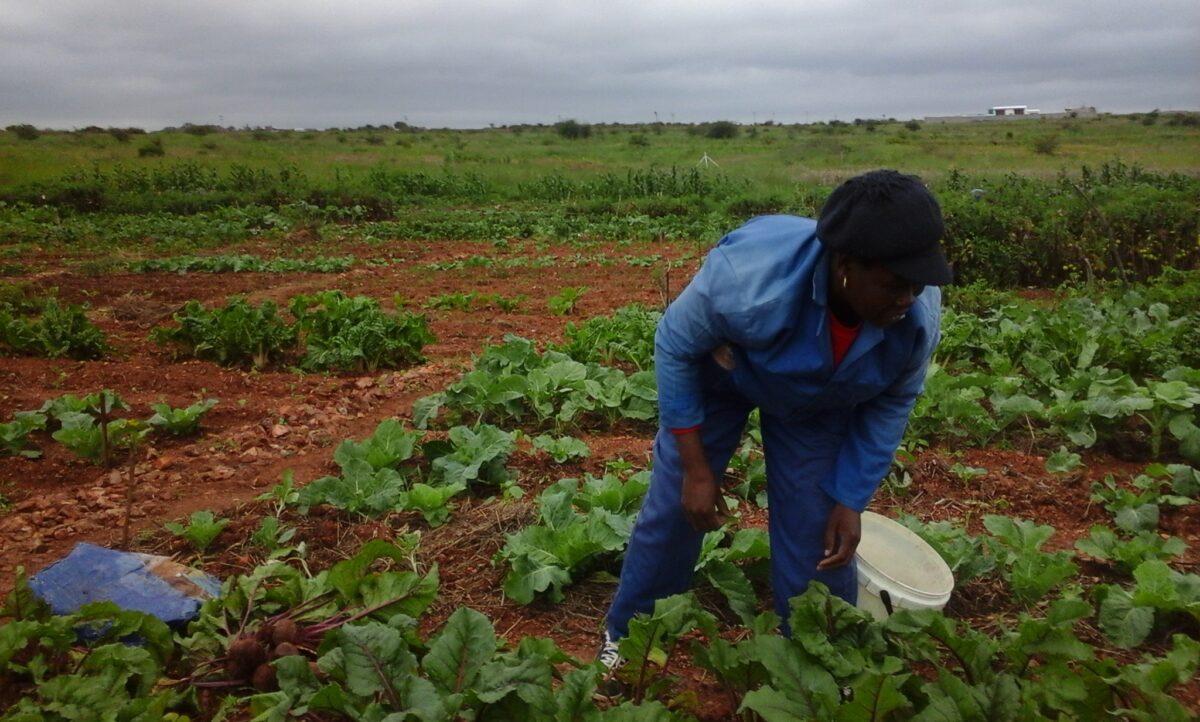At a time when food insecurity is also affecting urban residents in Zimbabwe, some women are turning pieces of land into thriving agriculture plots, growing anything from maize to vegetables, and even producing fish.
Aid agencies say a growing number of people in Zimbabwe’s urban areas are food insecure, with the Food and Agriculture Organisation (FAO) actively supporting local governments and residents to expand urban food resilience efforts by promoting food gardens.
In the country’s second largest city, Bulawayo, where municipality officials previously slashed crops grown on undesignated land, women have taken up the mantle to create thriving food ecosystems that are feeding their localities.

Marieti Mpala at her horticulture project.
Marieti Mpala runs one such urban agriculture project.
From an abandoned piece of land in Bulawayo not far from her home, Marieti has turned, what was considered a wasteland, into a green zone where she grows vegetables that include cabbages, onions, chomolia, tomatoes, and cucumbers.
She has also set up a pond where she breeds bream.
“I purchased the land more than a decade ago but only seriously started the agriculture project later,” Marieti said.
She has sunk a solar-powered borehole, ensuring a constant supply of water in a city long plagued by water shortages due to the failing electricity supply.
“I sell the produce at a low price so that the buyers can also sell and earn a living,” she said. She also acts as a local philanthropist doling out vegetables and other goodies to the elderly for free.
Not far from her small plot is also a group of women with backs bent working on a community garden.
Here, the women primarily grow chomolia, which is a staple green for many households in a country where low incomes have meant adjusting daily diets.
“We grow for our own kitchens while we also sell to whoever wants the vegetables,” said Agnes Mwale, an elderly resident who runs a portion of more than hundred vegetable beds found at the Sizinda township community garden.
Women in Zimbabwe constitute the bulk of domestic food producers-up to seventy percent by some estimatesworking the land against insurmountable odds such as lack of access to agri-loans and title deeds to their farm land. For Marieti, Agnes and others, the provision of infrastructure such as solar-powered boreholes will go a long way to ensure uninterrupted food production.
The Food and Agriculture Organisation (FAO) says if female farmers in Zimbabwe had the same access to productive resources as men, they would increase yields by up to thirty percent.
“We applaud the work being done by Marieti and others to ensure food security,” said Tinevimbo Maphosa, the local councillor.
“Such efforts should be replicated by others as we don’t want the usual complaints that times are hard,” Tinevimbo said.
The municipality has made commitments to make more land available to address food security, but for now, female urban farmers make do with what they have to ensure local solutions to food security.

Maintaining the community garden is back-breaking work, but worth the results.









